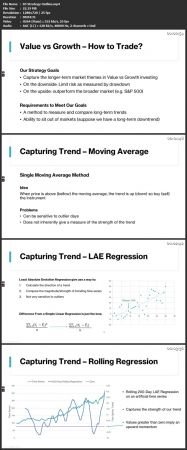
You should also bear in mind that funds rarely allow people to manage a "book" (i.e.
Quant hedge fund software#
A good publication record, open source software development/contribution and consulting in the area will all be great points to add to a CV. This could mean that if you're currently a 'reasonably good' expert in a particular area of relevance to a quant fund, then it is almost certainly worth "going the extra mile" and becoming THE expert on the topic. Thus you should only consider applying to the top firms if you feel that your area of research or computational skills are exceptional and that you can apply them to the financial domain in a short space of time. They are also particularly interested in candidates who have demonstrated a successful quantitative trading track record in the past (more on that below).įunds are currently finding it extremely hard to fill roles of this magnitude, but their success and resources give them time to hunt for the best individuals. This could mean a particularly strong knowledge of a specialist machine learning or signals analysis technique, deep experience of high-performance C++, Linux kernal tuning or network hardware latency optimisation or specialist portfolio construction methodologies. For example, they will often only take individuals who have a PhD, with a strong publication record in Mathematics, Physics or Computer Science and who can "bring something to the table" that they currently don't possess. The top tier firms are only seeking the absolute best candidates, who possess the strongest technical skillsets. The first thing to consider is that as with anything else in life that is subject to a ranking system there are "Tier 1" and "Tier 2" funds, as well as many lesser funds. What are the top quant funds looking for? Despite the intense competition, it is still possible to shine as a candidate, but you must be very well aware of what the funds are after, and then make sure you are providing it to them. In this article I will outline how I would go about applying for a role in a quantitative fund, were I applying today. While this may seem like a hopeless situation for those on a job hunt, I would argue instead that interview success just requires a different approach. Thus, in 2013, there is currently a distinct supply/demand imbalance for quantitative finance careers. Unfortunately, this has had the effect of creating intense competition for the top financial posts, particularly in the area of quantitative trading. For these two reasons there is now a substantial group of candidates who are well-qualified for many of these jobs, all competing in a global marketplace. The rise of the Masters in Financial Engineering (MFE) postgraduate course has further added to the quantity of talented individuals who are now after technical financial roles. Consequently many highly talented individuals are leaving academia at all levels and causing a significant increase in supply to these aforementioned financial roles. Out of this comes a growing disillusionment of pure research as a long-term career. This is particularly apparent in academia, where grant funding is becoming harder to obtain and a healthy work-life balance is becoming trickier to achieve. However, a financial crisis in the Western hemisphere coupled with other macro/socioeconomic factors has lead to a reduction in scientific and engineering budgets and later-stage investment in such technologies. It is only likely to continue as more markets emerge and new tradeable instruments are brought out. This trend has created large numbers of global quant analyst, software engineer and quantitative trading roles. The availability of data, sophistication of tools and speed of computation has opened up the market not only to more nimbler startup quant funds, but also to the retail algo trader.

Quantitative trading has grown to become a significant industry in the last ten years.


 0 kommentar(er)
0 kommentar(er)
